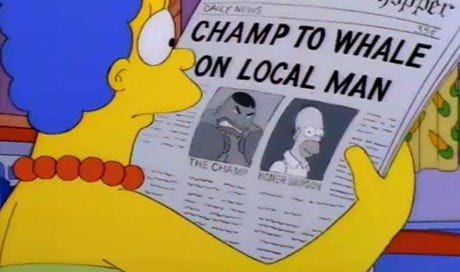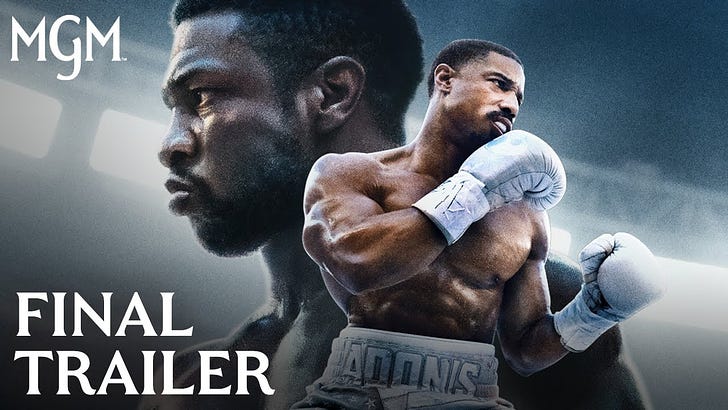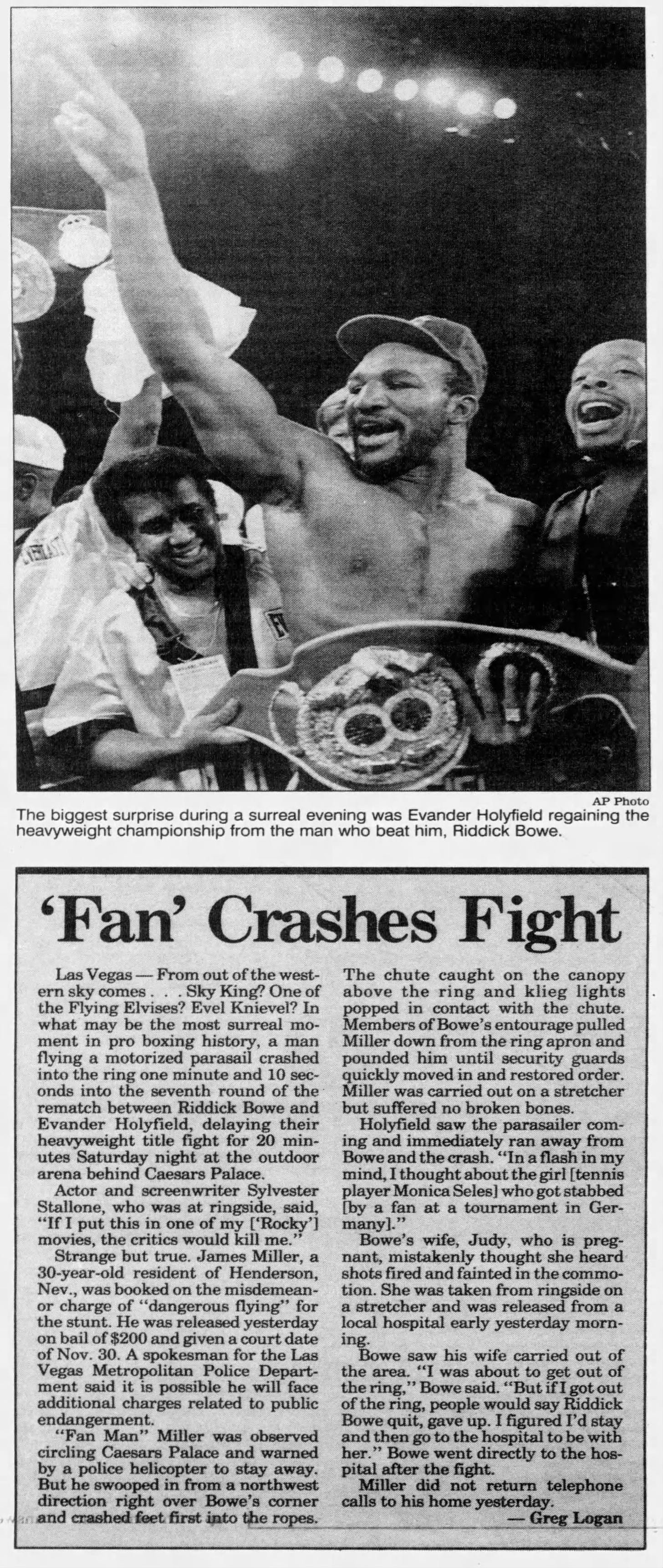Simpsons Saturday: The Homer They Fall
20 years after Rocky Balboa took champ Apollo Creed to the limit, Homer Simpson got a shot to do the same. It didn't go well for Springfield's favorite son.
Each July 4, Americans set aside their differences and unite in a celebration of a moment that changed the world forever. I am referring, of course, to World Heavyweight Champion Apollo Creed offering a title shot to unknown contender Rocky Balboa, a hard-luck underdog who takes the champ to his limit.
OK, I’m being facetious there — the Rocky vs. Creed showdown was actually on New Year’s Day 1976, not Independence Day. Apollo’s Star Spangled trucks only give the impression the film is on July 4.
Anyway, the quintessential underdog tale beautifully woven in Rocky still resonates as profoundly today as when it punched its way to the Academy Award almost a half-century ago.
Countless copycats have tried to hit the same notes Rocky achieves, including some of the film’s own sequels. And while there are other outstanding successors that follow in its footsteps, including several entries from the same franchise, the original Rocky is still the champ.
And, in the ultimate homage to its greatness, Rocky received The Simpsons treatment in celebration of the movie’s 20-year anniversary.
Debuting in November 1996, “The Homer They Fall” reached small screens almost 20 years to the day that Rocky premiered in New York. It’s the third episode of Season 8 and the second of the show’s usual format, with E1 that season being a “Treehouse of Horror” installment. Season 8 may be my favorite in the illustrious history of The Simpsons.
“The Homer They Fall” is one big reason why I hold the season in such high regard.
The episode’s primary plot takes some of its setup from Rocky: Heavyweight champ Drederick Tatum is slated to fight a local tomato can as a promotional gimmick to draw audiences for what is essentially an exhibition fight.
In this instance, the exhibition is intended to showcase Tatum’s violence to a bloodthirsty audience upon the champ’s release from prison. And there is an appropriate point in the newsletter to mention that along with the general setup borrowed from Rocky, “The Homer They Fall” functions more so as a satire of boxing.
The show’s writers offer several nods to the sport as it existed near the turn of the 21st Century. Rocky is the product of a somewhat idealized time for the sweet science, debuting to audiences two years after the legendary Rumble in the Jungle between Muhammad Ali and George Foreman and the year following the Thrilla in Manila pitting Ali against Joe Frazier.
Heavyweight boxing, which has always been the main attraction for American audiences, was in a golden age with such luminaries as Ali, Foreman and Frazier active.
And, in fact, it was an actual fight from this era that inspired Sylvester Stallone to write Rocky with Chuck Wepner giving Ali all The Greatest could handle in 1975.
In just 20 years, however, public opinion soured on boxing as a mainstream sport. The terrific book, Joseph Layden’s The Last Great Fight, examines Buster Douglas’ stunning knockout of Mike Tyson in 1990 as a turning point for the fight game.
Tyson’s disinterested effort in Tokyo against Douglas brought into the ring a variety of emotional issues plaguing the fighter who was, at one time, poised to take up the mantle from Ali as the face of boxing.
Outside of the ring, Tyson’s problems were too many to list here so I’ll keep it to the lowlights. Highly publicized allegations of domestic violence against Robin Givens followed Tyson for years, and became fodder for one of the more insane bits of parody ever committed to television.
The children’s cartoon Tiny Toonn Adventures satirized Tyson on a few occasions, including this easy joke about his high voice:
But the more gobsmacking instance is an episode entitled, “Eating Between The Lines” in which the canary Sweetie Bird has a copy of a then-fictional Mike Tyson biography dropped on her head. She emerges, quipping, “Now I know how Robin Givens feels.”
I found this write-up on the gag and one of the few still-accessible archives of the segment itself. It’s an accurate summary of ‘90s kids cartoons often getting way too risque for their target audience. Present-day critics of children’s media sometimes handwring that the content is too weighty and targeted at adults, but give me Inside Out 2 hitting on the complex emotional changes we experience in adolescence over domestic violence jokes.
Anyway, there’s an interesting juxtaposition between how a kid’s program satirized Tyson and The Simpsons’ approach to the same subject. And make no mistake, Drederick Tatum is a clear stand-in for Mike Tyson.
In addition to donning the same plain, black trunks that were a signature of Tyson’s, Tatum speaks with the same high-pitched voice and lisp. The Simpsons doesn’t play up the latter for laughs, however.
“The Homer They Fall” alludes to Tyson’s domestic violence allegations — in his 2013 autobiography The Undisputed Truth, Tyson wrote extensively of having a contentious relationship with Givens’ mother. Rewatching the episode with that knowledge, the revelation that Drederick Tatum is serving time for “pushing his mother down a flight stairs” comes off as more intentional.
Likewise, Tatum’s incarcernation and subsequent initial return to the ring against an opponent intended only to absorb punishment parallels Tyson. He was released from prison in March 1995, five months before facing journeyman Peter McNeely.
The manager for the wildly overmatched McNeely ended the fight a little more than a minute into the first round, much like Moe intervenes to prevent Homer from dying from Tatum’s onslaught.
Unlike Moe Szyslak, however, McNeely’s manager did not parachute into the ring. That was instead The Simpsons writers offering a nod to a 1993 Riddick Bowe-Evander Holyfield showdown interrupted when a man named James Miller came dropping into the crowd, causing Holyfield’s pregnant wife to faint.
The Fan Man incident encapsulates the rapid descent of boxing from mainstream sport to carny spectacle that began in the ‘90s and accelerated in the 2000s, leading us to today’s landscape wherein YouTube personalities are the biggest draws.
If one person is most responsible for that descent, it’s Don King. And, indeed, “The Homer They Fall” accurately lampoons King’s carnival barker antics. His fictitious stand-in, Lucius Sweet, pressures Moe into taking the fight with Tatum on Homer’s behalf, exploiting Moe’s own feelings of regret.
Once upon a time, Moe had his own heavyweight aspirations. But the beatings he took — represented in a hilarious regression of nicknames from “Kid Gorgeous” to “Kid Presentable” (a label I once used for online video games) to “Kid Gruesome” and finally, “Kid Moe” — denied Moe a shot at the big time.
Upon discovering Homer’s ability to take a beating unphased — the result of an extra 1/8-inch of fluid around his brain functioning as a built-in football helmet — Moe tries to ride Homer to boxing fame.
Yeah, so Homer’s no Rocky Balboa. There’s no “Gonna Fly Now” moment, and his…rise…up the ranks comes against opponents not anywhere near Spider Rico’s level. But “The Homer They Fall” is a worthy comedic interpretation of the Rocky story, and in contention as one of the funniest sports-themed episodes of The Simpsons.






